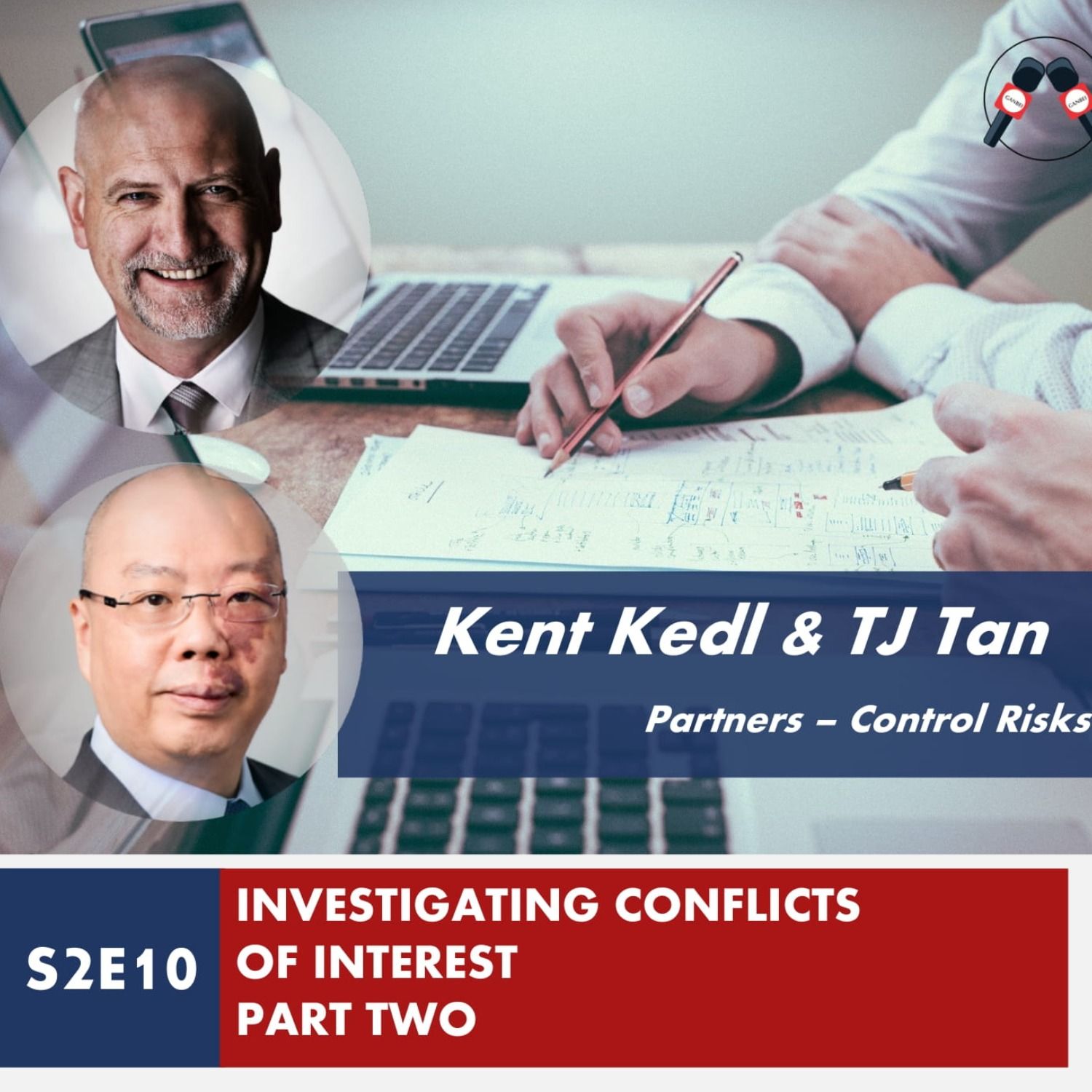Discover China Business Law Podcast
China Business Law Podcast

China Business Law Podcast
Author: Art Dicker, Agnes Wang
Subscribed: 9Played: 48Subscribe
Share
© 2019
Description
The China Business Law Podcast brings you a real world perspective on how business law is applied on the ground in China. Guests include both in-house and law firm professionals. The hosts are seasoned, practicing lawyers with decades of China experience.
50 Episodes
Reverse
Empowering Chinese American Lawyers: A Conversation with Amy ChenWelcome to another insightful episode of the China Business Law Podcast. Today, we are thrilled to have Amy Chen, a prominent legal professional and co-founder of the Chinese American Lawyers Association of Orange County (CALA). In this interview, Amy shares her extraordinary journey in the legal realm and her vision for empowering Chinese American contributions within the legal community.Meet Amy ChenConnect with AmyCALA WebsiteAmy Chen is not just any lawyer; she is a trailblazer in advocating for Chinese American voices within the legal industry. As the president of CALA, she is passionate about creating platforms that connect Chinese American legal professionals and fostering growth within this community. Her legal career spans from major law firms in Hong Kong to influential in-house roles in tech companies.A Legal Path Influenced by Family and CultureAmy’s legal journey started with an interest in business and China during her college years, which led to an inspiring stint at a law firm in Hong Kong. This experience cemented her decision to pursue law, fueled by both professional aspirations and family legacy—particularly her grandfather's groundbreaking achievements as a lawyer in Europe. Amy studied law at Columbia and began her career at Simpson Thacher before transitioning to pivotal roles in technology firms, including Alibaba during its formative years.Building Bridges Through CALAThe idea for CALA originated over lunch with a fellow lawyer, where they identified a need for a platform dedicated to addressing Chinese American legal challenges in Orange County. Starting with drafting bylaws, the association quickly evolved with a mission to develop, empower, and elevate the contributions of its members to the legal and civic landscape.Challenges and Opportunities in the Legal FieldAmy's career has seen significant shifts due to changing US-China relations, pushing her towards advocacy and community-focused efforts. She highlights barriers faced by Chinese American lawyers, such as underrepresentation in the upper echelons of the legal field and societal biases. CALA aspires to tackle these issues through professional development programs, legal education, and community engagement.Inspiring the Next GenerationFor aspiring lawyers, Amy offers invaluable advice: approach the legal profession with eyes wide open. It's a demanding field that requires a commitment to learning and a skill set that includes relationship-building and staying informed about global and industry-specific trends. Crucially, she stresses the importance of cultivating a network and finding mentors.Moving Forward: Advocacy and CollaborationWhile still in its infancy, CALA has ambitious plans to delve into advocacy, especially around pressing issues such as immigration and civil rights. The organization is also forging partnerships with other legal bodies and community groups to enhance its impact and outreach.Join the MissionUnder Amy’s leadership, CALA is on the path towards significant contributions to the legal community and beyond. For those interested in joining or learning more, Amy and CALA welcome engagement through their website at calaoc.org. Together, they are redefining the narrative and presence of Chinese American professionals in law and civic spaces.Thank you to Amy Chen for sharing her journey and insights. Her story is a powerful reminder of how dedication and community can drive impactful change. If you're interested in learning more about CALA's work or want to get involved, reach out through their website. Timestamps00:00 Introduction and Guest Welcome00:34 Amy Chen's Journey into Law03:22 Transition to In-House and Tech Industry04:24 Return to the US and Continued China Focus09:21 Founding the Chinese American Lawyers Association16:42 Asian American Representation in Law Firms17:08 Professional Development Initiatives18:29 Community Engagement and Civic Involvement18:41 Addressing Societal Bias and Discrimination21:32 Cultural Values and Corporate America25:08 Advocacy and Legal Parameters26:59 Collaboration with Other Organizations29:10 Advice for Aspiring Lawyers33:04 Conclusion and Contact Information
ProducerJacob ThomasFollow UsLinkedInApple Podcasts
Innovative Wealth Planning: Legal Perspectives with Henry Ji and Amber GuanWelcome to another insightful episode of the China Business Law Podcast. Today, we are privileged to host two exceptional legal experts, Henry Ji and Amber Guan, from Zhong Lun Law Firm. With their extensive expertise in wealth planning, they provide unique insights into the legal perspectives of managing wealth for high net worth individuals in China.Meet Our Experts: Henry Ji and Amber Guanguanxin@zhonglun.comhttps://en.zhonglun.com/team/henryji.htmlHenry Ji, a partner at Zhong Lun, and Amber Guan, a managing associate, are pioneers in the domain of private wealth planning. Both are dually qualified to practice law in China and New York State, USA, bringing a robust international perspective to their practice. Over the past eight years, they've been at the forefront of advising Chinese high-net-worth families and multinational companies on wealth planning.Emerging Trends in Wealth PlanningIn recent years, the focus of wealth planning in China has shifted from primarily wealth creation to more comprehensive strategies involving family asset protection, governance, and succession planning. Henry highlights the evolution in this field, particularly noting the change during the rapid capital market expansion and IPO activities from 2012 to 2021. Today, families seek integrated structures that address multiple needs like control, tax efficiency, and succession.Handling Cross-Border Wealth ChallengesAmber elaborates on the complexities of managing cross-border investments and assets. With varying legal systems and regulatory environments, cross-border wealth planning poses unique challenges. The divergence in these frameworks, coupled with China's strict currency controls, makes compliance a sophisticated process requiring coordination among legal, tax, and other professionals.Ensuring Compliance Amidst ScrutinyIn the face of increasing scrutiny from both Chinese and foreign governments, compliance becomes imperative. Henry and Amber stress the significance of strict adherence to legal and regulatory frameworks to avoid administrative or criminal liabilities. They emphasize the necessity for transparency, proper documentation, and alignment with international tax and reporting standards.Asset Protection Strategies for Chinese ClientsFor high net worth individuals, asset protection is a primary concern. Both experts recommend the use of trusts and insurance products as effective mechanisms. They advise on restructuring corporate governance and shareholding arrangements to safeguard personal assets and prevent business liabilities.Collaboration for Comprehensive Wealth PlanningWealth planning is multifaceted, involving legal advice, financial strategies, and tax implications. Henry and Amber work closely with financial advisors and tax experts to provide comprehensive solutions that are both legally sound and financially strategic. This collaborative approach ensures tailored solutions that align with clients' long-term objectives.Personalized Wealth Planning StrategiesEvery family is unique, and so are their wealth planning needs. The experts at Zhong Lun prioritize understanding each client's personal, family, and business landscapes to design strategies that are custom-fit. Whether the goal is protecting a family business, facilitating succession, or ensuring regulatory compliance, their approach is highly personalized.Building Long-Term Client RelationshipsTrust is the cornerstone of successful wealth planning, particularly in the realm of high net worth individuals. Henry and Amber emphasize building long-term relationships through consistent, reliable, and discreet services. They maintain regular communications and reviews to adapt to clients’ evolving needs.Contacting Zhong Lun for Wealth Planning ExpertiseFor those interested in leveraging the expertise of Henry Ji and Amber Guan in navigating the complexities of wealth planning in China, they welcome inquiries through email. Henry's contact details can be found on the Zhong Lun website, while Amber can be reached at guanxin@zhonglun.com. Their proficiency in legal nuances and dedication to client objectives make them invaluable allies in wealth management.Timestamps00:00 Introduction and Guest Welcome00:26 Guest Backgrounds and Expertise03:25 Current Trends in Wealth Planning06:41 Challenges in Cross-Border Wealth Planning10:17 Ensuring Compliance with Regulations13:47 Strategies for Asset Protection16:37 Balancing Legal and Financial Advice19:58 Succession Planning Concerns24:26 Personalizing Wealth Planning Strategies27:20 Building Long-Term Client Relationships30:33 Conclusion and Contact Information
ProducerJacob ThomasFollow UsLinkedInApple Podcasts
Dispute Resolution in China with Andy HanWelcome to another episode of the China Business Law Podcast. In this episode, we are privileged to host Andy Han, a partner at Allbright Law with expertise in cross-border dispute resolution involving China. His insights offer a deep dive into the intricacies of navigating legal disputes in the region.Introducing Andy HanConnect with AndyAllbright LawAndy Han brings over a decade of experience as an attorney in China, specializing in cross-border disputes and transactions such as M&A and Foreign Direct Investment (FDI) projects. His career journey provides him with a unique perspective on the challenges and resolutions in the legal landscape across borders, particularly during pivotal periods such as the COVID-19 pandemic.The Landscape of Cross-Border Dispute ResolutionDuring the COVID-19 pandemic, Andy aided foreign clients in navigating disputes arising from cross-border transactions, specifically the acquisition of medical supplies from China. He reflects on the spike in such disputes due to the urgent demand for medical products and the subsequent quality issues that arose.His expertise is not limited to dispute resolution; Andy also emphasizes the importance of drafting robust contracts. He recommends clearly defining dispute resolution clauses within contracts, choosing between litigation or arbitration carefully, based on applicable laws and enforceability.Choosing Between Arbitration and LitigationA significant part of cross-border contract negotiations involves deciding on dispute resolution mechanisms. In particular, Andy advises against including both litigation and arbitration in a single clause under Chinese law, as this can invalidate the litigation choice. Factors to consider include the nature of the dispute, cultural factors, and language.For example, in cases with a foreign element, foreign arbitration centers in third countries like Singapore or Hong Kong might be preferred for neutrality. However, if the contract involves purely domestic issues, Chinese arbitration centers or courts are advisable.Enforcing Arbitration Awards in ChinaAndy shares insights into the enforcement of arbitration awards within China. For domestic awards, enforcement is typically straightforward without the need for additional recognition processes. However, enforcing foreign arbitration awards can be more complex, often involving recognition by Chinese courts under the New York Convention.Recent trends show improvement in the enforcement of foreign arbitral awards, with a success rate over 90% in certain scenarios. Yet, challenges remain, such as proper notification to respondents in defaults or exceeding the scope of the arbitration agreement.Practical Advice for Foreign EnterprisesBeyond addressing disputes, Andy stresses the importance of preventive measures. Conducting thorough background checks on potential business partners can preemptively mitigate risks. Additionally, recognizing fully foreign-owned enterprises in China as domestic companies can influence the governance and dispute resolution approaches.Proactive Measures and Government InitiativesThe Chinese government is increasingly supportive of foreign arbitration centers establishing branches within China, facilitating a more integrated and accessible legal framework. This aligns with broader efforts to attract international business and enhance trust in China’s legal system.Final Thoughts and Reaching OutAndy Han encourages foreign in-house counsel to carefully consider dispute resolution clauses during negotiations and remain proactive in preventing disputes. For further guidance, Andy can be reached through LinkedIn or his firm's contact details.Timestamps00:00 Introduction and Guest Welcome00:15 Andy's Background in Cross-Border Dispute Resolution01:59 Key Considerations in Cross-Border Contracts03:26 Litigation vs. Arbitration in China07:50 Enforcement of Arbitration Awards in China18:49 Trends and Practical Advice for Foreign Companies24:24 Final Thoughts and Contact Information
ProducerJacob ThomasFollow UsLinkedInApple Podcasts
Resolving Corporate Conflicts in China with Tim Yiming LiuWelcome to another episode of the China Business Law Podcast! This episode features an insightful discussion with special guest Tim Yiming Liu, a partner at Global Law Office in Shanghai. We dive deep into aspects of cross-border dispute resolution and Tim’s extensive experience in the field, providing listeners with expert knowledge on navigating the complexities of legal disputes involving Chinese and foreign clients.Introduction to Tim Yiming LiuSend Tim an Email: timliu@glo.com.cnTim Yiming Liu is a seasoned partner at Global Law Office in Shanghai, specializing in China domestic and cross-border dispute resolution. His clients include high-profile companies such as ByteDance, Goldman Sachs, Nomura, SoftBank, Lenovo, Nestle, and Amazon, to name a few. With a professional background that spans over two decades, Tim’s expertise lies in resolving disputes from corporate governance, shareholder rights, and complex M&A transactions to liquidation and bankruptcy issues.Tim’s Journey in Dispute ResolutionTim began his career as a transactional lawyer, engaging in M&A, private equity, and venture capital deals. With changes in the global business landscape, Tim transitioned into dispute resolution, leveraging his cross-border qualifications and his sharp acumen in business law. As someone fluent in both English and Chinese, he adeptly manages Chinese and international client perspectives, offering a unique dual representation advantage in arbitration and litigation.The Landscape of Cross-Border Legal DisputesDuring the podcast, Art and Tim explore various challenges that arise during cross-border legal disputes. Common cases Tim handles include corporate and commercial disputes, shareholder disagreements, and M&A conflicts. Art delves into how foreign enterprises face litigation challenges in China and how Chinese firms confront unique obstacles in international jurisdictions, highlighting issues such as service of process, discovery, and interim measures.Challenges with Discovery and Data SecurityArt and Tim explore the discovery process, a crucial yet complex element of cross-border litigation. Chinese companies often struggle with discovery requirements in foreign jurisdictions due to unfamiliarity and cultural differences in legal procedures. The protection of sensitive business data, constrained by China’s stringent cybersecurity and data security laws, often complicates evidence submission in cross-border disputes.Insights on Attorney-Client PrivilegeThe concept of attorney-client privilege differs notably between jurisdictions like China and the U.S. While U.S. law offers robust protections, Chinese law does not formally recognize such privileges, compelling Chinese firms to adapt by involving U.S. counsel in applicable scenarios to benefit from this protection in cross-border disputes.Strategies for Dispute Resolution and SettlementTim emphasizes the importance of strategic decision-making in dispute resolution, particularly concerning jurisdiction and enforceability. Chinese courts, especially in metropolitan areas, are adept at handling complex commercial disputes impartially, offering a compelling venue for legal proceedings, depending on asset location and enforceability concerns.Calculating the Cost and Strategy of SettlementsAn integral part of Tim’s litigation strategy involves continuous assessment of settlement options throughout the legal process. Factors such as litigation cost, potential outcomes, and the overarching business relationship often guide the decision to pursue settlement negotiations, balancing cost efficiency with optimal resolution outcomes.ConclusionThis episode offers a treasure trove of insights for legal professionals and businesses alike, emphasizing the nuanced landscape of cross-border legal disputes. Tim’s expertise and strategic approach shine a light on the critical considerations for navigating international legal waters effectively. Timestamps00:00 Introduction and Guest Introduction01:03 Tim Yiming Liu's Professional Journey03:25 Common Cases and Disputes06:45 Challenges in Cross-Border Disputes10:00 Discovery and Data Compliance20:20 Attorney-Client Privilege and Legal Strategies22:26 Litigation and Arbitration Strategies29:08 Settlement Considerations34:08 Conclusion and Contact Information
ProducerJacob ThomasFollow UsLinkedInApple Podcasts
Chinese Multinationals and US Laws with Li JiOn today’s episode of the China Business Law Podcast we are privileged to speak with Professor Li Ji from the UC Irvine School of Law. Professor Li shares insights from his comprehensive book, "Negotiating Legality: Chinese Companies in the U.S. Legal System," exploring the intricate challenges and strategies of Chinese multinational companies operating in the United States.Introduction to Professor Li JiRead Negotiating LegalityProfessor Li Ji is a respected authority on the legal dynamics faced by Chinese companies in the U.S., having transitioned from a career in corporate tax law to academia, with a focus on compliance and legal risks. His research provides a nuanced understanding of how these companies navigate the U.S. legal environment while maintaining ties to Chinese cultural norms.The Role and Influence of In-House CounselOne of the key topics of our discussion revolved around the qualifications and influence of in-house counsel at Chinese companies in the U.S. Many companies do not employ full-time in-house counsel due to cost concerns, and those that do often prefer lawyers with Chinese backgrounds to bridge cultural differences effectively. This bicultural fluency aids them in educating headquarters about the legal risks of conducting business in the U.S.Interaction Patterns with U.S. Legal SystemsChinese companies often face a geopolitical and cultural learning curve when engaging with the U.S. legal system. Professor Li highlights their initial hesitance to escalate disputes due to a normative reluctance to litigate, which may be perceived as a weakness. Over time and through experience, however, these companies adapt to a more U.S.-style cost-benefit analysis.Litigation and Regulatory ChallengesLitigation, particularly in intellectual property, product liability, and contractual disputes, varies widely based on industry. Chinese multinationals must comprehend the demanding nature of U.S. litigation, notably the expansive discovery process. A combination of internal adaptation and expert external counsel is crucial for successfully navigating these challenges.Choosing the Right Legal RepresentationThe dual institutional pressures from both Chinese and U.S. norms implicate the selection of legal representation. While large multinationals might partner with major law firms familiar from their home country, smaller firms lean towards cost-effective, flexible solutions. The trust and cultural familiarity are pivotal in building enduring relationships with external counsel.Adapting to a Changing Geopolitical ClimateIn light of evolving U.S.-China relations, Chinese companies must strategically manage their U.S. operations. This includes structuring businesses to mitigate risks associated with their Chinese identity, such as establishing operations in neutral territories like Singapore or Switzerland.ConclusionProfessor Li Ji's insights underscore the complexities and dynamic adaptations required by Chinese multinational companies operating in the U.S. legal landscape. His book, "Negotiating Legality: Chinese Companies in the U.S. Legal System," is crucial reading for understanding these transitions. We encourage our listeners to delve into the book for a deeper exploration of these themes. Timestamps00:00 Introduction and Guest Welcome00:58 Professor Li Ji's Background and Career02:09 Chinese In-House Counsel in the U.S.03:58 In-House Counsel's Role in Decision Making08:23 Challenges for Chinese Companies with Outside Counsel19:09 Litigation and Legal Risks for Chinese Companies25:00 Navigating U.S. Regulations and Government Interaction33:58 Conclusion and Book Promotion
ProducerJacob ThomasFollow UsLinkedInApple Podcasts
Insights into One of China’s Largest Foreign Investments: A Conversation with Lyon DongWelcome to anotherepisode of the China Business Law Podcast! This time, we're joined by Lyon Dong, an esteemed partner and head of the Cross-Border Transaction Department at Grandall Law Firm. In this episode, we delve into one of the most intricate and monumental legal transactions in recent history: the acquisition by Aramco of a 10% interest in Rongxiang Petrochemical.Introduction to Lyon DongLyon is a seasoned transaction lawyer with a unique blend of PRC and U.S. legal expertise. With over 16 years in the cross-border M&A field, Lyon leads a team at Grandall that boasts a robust portfolio and client base. His experience and bicultural understanding have made him a pivotal figure in international legal negotiations.The Aramco Deal: A Case Study in ComplexityThe Aramco purchase of a 10% interest in Rongxiang Petrochemical for over $3 billion was a high-profile, complex transaction. It required navigation through multiple layers of legal structuring and involved significant government approvals.From Opportunity to ExecutionLyon recounts how the transaction, initially stalling due to communication barriers with local counsel, was revitalized. His team stepped in through a combination of industry connections and sheer luck, and with the backing of their reputable firm.Government Involvement and Cultural NuancesA significant aspect of this deal was the necessity to align with Chinese governmental interests. This transaction was not just a business maneuver but a diplomatic engagement, demonstrating the strengthening Sino-Saudi relations.Bridging Cultural Communication GapsLyon emphasizes the importance of bicultural competence in cross-border negotiations. Effective communication transcends language, requiring an understanding of cultural contexts and negotiation styles. This became crucial in aligning both the Saudi and Chinese parties.Overcoming Unexpected ChallengesThe Role of Luck and ExpertiseLyon openly attributed a portion of his team’s success to luck but made it clear that expertise and preparation were indispensable. Securing the deal required deft handling of unexpected regulatory and logistical challenges.Government and Regulatory NavigationNavigating the bureaucratic landscape was a formidable challenge. Approval processes from multiple governmental bodies had to be synchronized with commercial interests, underlining the importance of strategic planning and timing.The Critical Importance of TimelinesThe deal was tightly bound to a timeline dictated by Rongsheng's leadership, emphasizing the pressure to expediently manage multi-jurisdictional regulatory approvals and secure financial transactions.Conclusions and ReflectionsLyon’s story is a testament to the intricacy and excitement of cross-border M&A transactions. His ability to manage the multifaceted challenges demonstrates why he is a leading figure in this field. This episode serves as an invaluable resource for businesses and legal professionals looking to understand the nuances of international transactions.If you're seeking the expertise of a seasoned lawyer with a deep understanding of international business law, or you’re just fascinated by high-stakes legal maneuvering, this episode offers a wealth of insights. Timestamps00:00 Introduction and Guest Welcome00:40 Lyon Dong's Background and Career02:04 The Aramco-Rongxiang Deal: An Overview03:10 Challenges and Misunderstandings in the Deal08:33 Negotiation Dynamics and Cultural Differences14:29 The Role of Government and Regulatory Approvals31:00 Logistics and Timezone Management46:36 Understanding the Crude Oil Sales Agreement (COSA)48:24 Regulatory Challenges and Strategic Planning49:24 Anti-Monopoly Concerns and Legal Strategies50:30 Navigating Reporting Obligations52:26 The Importance of Legal Counsel and Client Communication01:02:20 National Security Review and Approval Process01:08:00 Stock Exchange Approval and Final Hurdles01:25:36 Closing the Deal: Final Steps and Reflections
ProducerJacob ThomasFollow UsLinkedInApple Podcasts
Co-hosts Art and Iris talk with Bingtao Li, General Counsel at BASF Shanshan Battery Materials Co., Ltd, a joint venture of BASF in China which specializes in the R&D, production and sales of lithium battery cathode materials. On what it takes to be an effective general counsel in China, especially at a Sino-foreign joint venture. A great episode you won't want to miss.Producer
Jacob Thomas
Follow Us
LinkedIn
Apple Podcasts
China's New Company Law: Impacts and Implications with Expert Camille XuIn this episode of the China Business Law Podcast, guest expert Camille Xu from Yingke Law Firm, provided an in-depth analysis of the significant changes to the China company law. With her vast experience in corporate law, Camille offers critical insights into how these amendments will impact businesses operating in China, particularly foreign-invested enterprises.Connect with CamilleVisit Yingke Introducing Camille XuCamille Xu, a seasoned attorney based in Shanghai, has spent over a decade at top-tier European law firms before joining Yingke as a partner. Her expertise lies in assisting foreign companies with their operations in China, covering areas such as corporate, contract, and labor law. Xu brings a nuanced understanding of the recent changes to the company law that are crucial for businesses to navigate effectively.Major Changes in Capital Contribution RequirementsOne of the pivotal changes discussed during the podcast is the revised capital contribution requirements. Previously, companies were required to make real contributions of capital within a specified time, but the 2013 reforms allowed for subscriptions of capital with flexible deadlines. However, the new law reintroduces a statutory requirement for capital payment within five years, reverting to stricter control measures to curb market chaos and avoid shell companies with unpaid capital posing as substantial entities.Xu advises companies to reassess and possibly reduce their registered capital to align with their actual business needs, helping to mitigate risks under the new legal framework.Enhanced Protections for Minority ShareholdersThe updated law aims to reinforce the rights of minority shareholders, notably extending the right to access accounting documents rather than mere account figures. This change enhances transparency and allows minority shareholders to access essential documents such as invoices and contracts, improving their ability to protect their interests.The law also includes provisions that enable minority shareholders to challenge invalid resolutions and demand timely profit distributions, along with mechanisms for share buybacks in cases of major strategic changes like mergers.Fiduciary Duties and Corporate GovernanceXu discusses how the revised law strengthens fiduciary duties, emphasizing the responsibilities of directors and senior management to act with loyalty and diligence. Notably, the law introduces the concepts of de facto and shadow directors, ensuring that those exerting control behind the scenes are held accountable.The amendments aim to curb the frequent practice of appointing nominal directors who lack real authority or understanding of company affairs, thereby protecting the company and its stakeholders from potential misconduct and negligence.Introduction of the Audit CommitteeTo streamline corporate governance, the new company law allows companies to establish audit committees instead of traditional boards of supervisors. This move is intended to enhance efficiency by involving professionals with accounting and management expertise to oversee corporate operations.Xu explains that these changes are poised to simplify company structures and improve oversight by relying on professionals already integrated into the company's board.Employee Representation on the BoardOne of the significant new provisions is the requirement for companies with over 300 employees to include an employee representative on the board. Although still in its early stages, this change is designed to give employees a voice in corporate governance, although the specifics of implementation remain to be detailed.Flexibility with Share ClassesThe law now permits greater flexibility regarding share classes, aligning more closely with international standards. Companies can issue shares with varying rights concerning dividends, voting, and liquidation, enhancing the attractiveness of investments and facilitating smoother operations for startups and foreign enterprises.Advising Clients on Compliance and StrategyCamille Xu stresses the importance of revising corporate bylaws in light of the new company law. Companies need to ensure compliance, particularly regarding capital contribution timelines, appointment of management roles, and equity transfer provisions. She emphasizes the need for companies to adapt their internal governance to align with the stringent requirements introduced by the new law.ConclusionThe comprehensive changes to China's Company Law present both challenges and opportunities for businesses operating in the region. By updating their internal policies and legal strategies to reflect these changes, companies can position themselves for compliance and growth in China's rapidly evolving business landscape. For more in-depth guidance, Camille Xu is available for consultations via email, with her contact details accessible in the podcast show notes for listeners seeking further advice. Timestamps00:00 Introduction and Guest Welcome00:27 Camille Xu's Background and Expertise01:10 Overview of Changes in Company Law01:31 Capital Contribution Requirements04:17 Impact on Small and Foreign Companies11:48 Protection for Minority Shareholders19:56 Fiduciary Duties and Legal Responsibilities26:49 Role of Supervisors and Audit Committees30:18 Employee Representation on Boards33:00 Flexibility in Share Classes37:58 Advising Clients on New Company Law42:54 Conclusion and Contact Information
ProducerJacob ThomasFollow UsLinkedInApple Podcasts
Navigating Arbitration Awards in China: Insights from the China Business Law PodcastWelcome to another episode of the China Business Law Podcast. In this episode, we talk with Yanqi Qiyan, a seasoned partner at Tahota Law Taihe Tai, one of China's premier law firms. We explore the complex terrain of arbitration awards in China and offer invaluable guidance for companies dealing with cross-border legal challenges.Connect with YanVisit TahotaEmail Yan Meet Yanqi QiyanYanqi Qiyan brings over 15 years of extensive experience in Chinese and international law. Her journey commenced as a law counsel at a US international law firm in China, eventually transitioning to key in-house roles at multinational corporations. Yan's expertise spans international practices, mergers, acquisitions, and general corporate matters, making her an ideal voice on disputes concerning arbitration awards in China.Understanding China's Stance on Arbitration AwardsOne of the chief topics addressed in this episode is the importance of arbitration awards for foreign companies dealing with Chinese entities. Art and Yan delve into the mechanisms by which arbitration awards can be recognized in China, emphasizing China's participation in the New York Convention. This treaty, unlike the situation with foreign court judgments, ensures a framework for the enforcement of international arbitration awards within China.China's Legal Framework: An OverviewYan elaborates on China's legal framework for recognizing foreign arbitral awards, highlighting the significance of the Supreme People's Court's notice and the incorporation of these regulations into China's civil procedure law. Five key issues have been addressed within Chinese law to facilitate the implementation of the New York Convention, ensuring clear guidelines for the recognition and enforcement of commercial arbitration awards.Comparing Arbitration Awards and Court JudgmentsThe podcast contrasts the relatively straightforward process for arbitration awards with the complexities of enforcing foreign court judgments, which rely on bilateral treaties or reciprocal relations. Yan clarifies how the absence of a treaty between countries like the US and China can impact the enforceability of judgments and emphasizes the value of understanding these distinctions for businesses navigating cross-border disputes.Practical Steps to Enforce a Foreign Arbitration Award in ChinaYan outlines the procedural steps involved in getting an arbitration award recognized in China, including the need to ensure its effectiveness and the importance of having all relevant documents notarized and consularized. The discussion also touches on China's accession to the Hague Convention, simplifying certain processes for Hague member countries.Potential Pitfalls: Grounds for RefusalWhile the process is generally smooth, certain grounds can lead to the refusal of recognizing a foreign arbitration award. Yan highlights Article 5 of the New York Convention, which lists potential reasons for refusal, such as the invalidity of the arbitration agreement or procedural irregularities.New Developments: Foreign Arbitration in ChinaA notable development is Shanghai's recent legal ruling that permits foreign arbitration commissions to conduct ad-hoc arbitrations within China. This change could significantly streamline the enforcement process, rendering foreign arbitral awards more akin to Chinese awards in terms of recognition, thus saving time and reducing costs.Strategic Considerations and the Role of Public PolicyArt and Yan delve into the strategic considerations for companies deciding between arbitration inside or outside China. Important factors include the need for speed, confidentiality, and how public policy could impact the enforceability of awards. Yan offers insights into how China's public policy considerations are seldom invoked but can influence outcomes in cases dealing with issues like weaponry trading or cryptocurrency.Conclusion: Evolving Landscape and Future OpportunitiesAs the episode concludes, it is clear that the arbitration landscape in China is evolving, offering new opportunities for foreign companies to navigate the complexities of cross-border enforcement more efficiently. Yan's expertise provides a guiding light for companies seeking to protect their interests in the rapidly changing legal environment in China.If you have questions, feel free to reach out to Yanqi Qiyan through her firm's website or LinkedIn. Her wealth of knowledge and experience remains an invaluable resource for anyone involved in cross-border legal matters with China. Timestamps00:00 Introduction and Guest Welcome00:58 Guest Background and Experience02:04 Understanding Arbitration Awards in China02:40 New York Convention and Enforcement05:37 Practical Steps for Enforcing Arbitration Awards07:04 Challenges and Grounds for Refusal12:20 Recent Developments in Arbitration14:54 Injunctions and Enforcement17:41 Choosing Between Arbitration and Court19:24 Enforcing Foreign Arbitration Awards in China21:06 Preparing for Recognition of Foreign Awards23:01 Public Policy Considerations in China24:26 Examples of Denied Awards25:49 Impact of International Relations on Enforcement27:33 Chinese Court's Approach to Enforcement30:11 Remedies for Denied Recognition31:46 Choosing Arbitration Location35:31 Conclusion and Contact Information
ProducerJacob ThomasFollow UsLinkedInApple Podcasts
Connect with Yin GeVisit Han KunConnect with Art Dicker Examining Financial Services Liberalization in China: Insights from Yin Ge of Han Kun Law FirmWelcome to another vibrant episode of the China Business Law Podcast! In this episode, host Art Dicker sits down with Yin Ge, a partner at the renowned Han Kun law firm, to discuss the ongoing liberalization of the financial services and asset management industry in China. Yin Ge, with her extensive experience and accolades in the field, shares her expert insights on the evolving regulatory landscape and what it means for both foreign and domestic players.Introduction to Yin GeYin Ge is a distinguished partner at Han Kun, one of China's leading law firms. With a rich background that includes stints at Clifford Chance and Allen & Overy, and an impressive academic resume featuring Huazhong University of Science and Technology, Wuhan University, and an LL.M. from Cornell, Yin is a powerhouse in the realm of financial law. She has advised various international asset managers, trading houses, financial institutions, and sovereign wealth funds on cross-border investments and regulatory issues in China.Key Areas of FocusYin begins by examining the particular types of clients she works with, delving into asset management and financial services sectors. Her clients range from large asset managers and sovereign wealth funds to hedge fund managers and trading firms. What stands out in her practice is the diverse nature of asset management in China, which spans secondary and primary markets, and covers distinctive fiduciary duties.Asset Management ClientsYin explains that her asset management clientele includes major players like BlackRock and sovereign wealth funds, as well as hedge fund managers like Bridgewater and trading firms such as Citadel. These firms operate on both secondary and primary markets, managing investments entrusted by clients in a manner that aligns with both local and international regulations.Financial Services LandscapeIn the financial services sector, Yin highlights her focus on innovative financial services rather than traditional banking transactions like loans. Her clients include global financial institutions, custodian banks, prime brokers, and financial infrastructure operators. Notably, she advises exchanges, both local and foreign, enhancing their operational frameworks to ensure compliance with local regulations.Realities of Financial Sector LiberalizationOne of the focal points of the discussion is China's genuine effort to open up its financial sector. Over the past few years, the Chinese government has introduced numerous policies allowing greater foreign participation. For instance, several wholly foreign-owned mutual fund management companies and securities firms have been established, reflecting this liberalization. Yin confirms that this trend is very much real, with the government not only making promises but also delivering on them through the issuance of approvals and licenses.Navigating the JV vs. WFOE DilemmaYin elaborates on the strategic decisions facing foreign firms—whether to establish wholly foreign-owned enterprises (WFOEs) or joint ventures (JVs). While there is a historical preference for WFOEs to ensure maximum control, she points out that JVs can offer significant advantages, particularly by leveraging local partners' distribution channels and market knowledge. The shift in regulations now allows foreign firms to hold controlling stakes in JVs, which makes this option more attractive than in the past.Why China is Evolving Its Regulatory EnvironmentArt raises an insightful question about why the Chinese government has opted to liberalize the financial services sector. Yin explains that this shift aligns with China’s goal of becoming a 'nation with a strong financial sector.' The government is keen on attracting foreign capital and expertise, which can elevate domestic standards and integrate China more deeply into the global financial ecosystem.Importance of Compliance and TalentYin emphasizes that the future of China's financial sector lies in higher quality, transparency, and robust compliance. She predicts that financial regulation will only strengthen, and foreign firms must be prepared to navigate this complex landscape by adhering to stringent compliance measures.Projections for Future LiberalizationLooking ahead, Yin foresees continued liberalization, albeit within a framework of more rigorous regulation. The emphasis will be on incremental reforms that build on existing structures, ensuring stability while fostering growth and innovation.ConclusionThis illuminating conversation with Yin Ge sheds light on the transformative changes underway in China's financial services sector. For entities eyeing opportunities in this dynamic market, understanding the evolving regulatory landscape and strategic options is crucial. Yin’s expert insights provide a roadmap for navigating this complex yet rewarding terrain.Timestamps00:00 Introduction and Guest Welcome00:21 Yin Ge's Background and Expertise01:43 Client Types and Common Issues in Asset Management03:52 Financial Services and Innovative Programs05:54 Liberalization of China's Financial Sector11:58 Joint Ventures vs. Wholly Foreign-Owned Enterprises16:00 Regulatory Environment and Future Trends24:26 ESG Standards and Challenges27:52 FinTech and Blockchain in China30:07 Future of Financial Services in China33:30 Conclusion and Farewell
ProducerJacob ThomasFollow UsLinkedInApple Podcasts
Navigating China's Foreign Investment in Telecom Services with Tracey TangIn the latest episode of the China Business Law Podcast, host Art Dicker sits down with Tracey Tang, a partner at AnJie Broad, to discuss the potential relaxation of value-added telecom services regulations in China and its implications for foreign internet companies. This conversation is especially timely, given the evolving regulatory landscape and the increasing interest of foreign businesses in the Chinese market.Introduction to Tracey TangTracey Tang, a well-known partner at AnJie Broad, has extensive experience navigating the complex regulatory environment in China. Her insights into the recent reforms of the value-added telecom services regulations are crucial for understanding what changes may lie ahead.Overview: The Big Change for Foreign ParticipationArt kicks off by introducing the topic: the latest developments in the reform of telecom service regulations that may allow for more foreign participation. This is a significant change for foreign internet companies interested in investing in China.Historical Context and Current ChallengesTracey provides an overview of how e-commerce and other value-added telecom services, like internet data centers, content distribution networks, and commercially-oriented websites, have historically fallen under various regulatory categories. She emphasizes the hurdles foreign companies face in obtaining the necessary licenses.New Guidelines and Potential ImplicationsArt and Tracey discuss the new guidelines anticipated from local governments and how these will impact foreign investment. "Whenever a specific license has been granted, that's the timing we should celebrate,” says Tracey, highlighting that while there is a clear trend toward openness, each license is typically granted on a case-by-case basis.The Reality on the GroundAs Art notes, China aims to project an image of welcoming foreign investment, but the reality is nuanced. The podcast dives deep into the implications of the potential regulatory changes, particularly concerning the value-added telecom services that have been tightly controlled over the past 20 years.The Complex Web of LicensesThe duo explore the intricate web of licenses required for internet businesses to operate in China. This includes the distinctions between ICP (Internet Content Provider) licenses and other essential regulatory clearances, and the historical limitations that prevented wholly foreign-owned enterprises from obtaining these licenses.Practical Advice for Foreign CompaniesArt and Tracey agree on the challenging nature of navigating China’s regulatory environment but offer practical advice for foreign companies. Tracey suggests a "wait and see" approach while remaining proactive by consulting local authorities and being prepared to adapt as new guidelines and pilot programs are rolled out.Real-World Examples and Case StudiesThe podcast also highlights specific examples, such as the liberalization of app store licenses in pilot areas like the Shanghai Free Trade Zone. Despite the opportunities, there remains caution, as only a few licenses have been granted to foreign companies.The Dual Structure StrategyTracey introduces the concept of a dual structure where companies maintain their existing structures while also applying for new licenses. This strategy helps mitigate risk and enhances operational flexibility.Conclusion: Navigating Uncertainty with Expert GuidanceArt wraps up the discussion by emphasizing the importance of understanding both the written regulations and the unwritten rules that influence regulatory decisions in China. He thanks Tracey for her detailed and candid insights, acknowledging the importance of expert guidance for companies looking to enter the Chinese market.Connect with Tracey TangFor more in-depth consultation, Tracey Tang can be reached through LinkedIn, despite its restriction in mainland China. She actively publishes articles and stays connected with industry professionals and clients.Timestamps00:00 Sponsorship Acknowledgements00:59 Introduction to Telecom Services Reform01:15 Implications for Foreign Internet Companies01:24 E-commerce and Licensing Challenges01:47 Potential Changes and Government Trends03:07 Regulatory Landscape and Licensing06:18 Navigating the Complex Regulatory Environment08:38 Case-by-Case Approach and Pilot Zones16:13 Foreign Companies and VIE Structures19:34 Conclusion and Contact Information
ProducerJacob ThomasFollow UsLinkedInApple Podcasts
Tracey Tanghttps://www.linkedin.com/in/tracey-tang-9b294920/Art Dickerhttps://www.linkedin.com/in/art-dicker/ Navigating China's New App Filing Requirements: Key Insights from Tracey TangWelcome to another insightful episode of the China Business Law Podcast! In this episode, host Art Dicker is joined by Tracey Tang to discuss the recent changes to app filing requirements in China and their implications for foreign companies. Tracey, an expert in TMT (Technology, Media, and Telecom) law, offers a thorough overview of the new regulations, the compliance challenges, and practical advice for navigating this complex landscape.Introduction to Tracey TangTracey Tang is a seasoned attorney specializing in content licensing and digital entertainment industries. With over 20 years of experience, particularly in China, she provides a wealth of knowledge on the evolving regulatory environment for foreign companies operating in the digital space.Understanding the New App Filing RequirementsWhat’s New?As of April 1st, new rules mandate that apps in China must undergo a filing process. An app without a filing number could face significant difficulties on both Apple's App Store and various Chinese Android app stores.The Implications for DevelopersDevelopers must have a company registration in China, host their app on a China-based server, and ensure the app uses a domain name registered in China to complete this filing. This regulatory move aims to bring more stringent control over app distribution and ensure compliance with local laws.Key Challenges for Foreign DevelopersAndroid vs. Apple App StoresWhile the Android app stores have already started enforcing these rules strictly, Apple's enforcement has been more gradual. This leniency from Apple is not expected to last long, and developers should prepare for stricter compliance checks soon.Impact on Foreign DevelopersFor many foreign developers, the new requirements present a significant hurdle, as they often lack the infrastructure and partnerships in China to meet these new demands. Tracey explains that foreign developers will either need to set up a local entity, which can be time-consuming and costly, or partner with a Chinese company that already meets the regulatory requirements.Compliance Strategies: Navigating the Red TapeWork with Chinese PartnersOne practical approach is to collaborate with a Chinese partner who can navigate the regulatory landscape and manage compliance issues. This partnership can also help expand the app's user base in China.Set Up Local EntitiesFor companies keen on maintaining direct control, setting up a wholly foreign-owned enterprise (WFOE) in China is another route. While this provides more control, it comes with higher costs and regulatory scrutiny. Tracey advises that setting up a company is relatively straightforward; the challenges arise in obtaining the necessary licenses and permissions specific to the type of business.Specific Challenges in the Gaming IndustryHeavily Regulated SectorThe gaming sector faces even stricter regulations. To publish a game in China, companies need an ISBN approval—a process that can only be carried out by a Chinese publisher with an Internet Content Provider (ICP) license. Foreign companies can’t publish games directly and must work with local entities.Extended ComplianceTracey highlights that even non-gaming apps can fall into heavily regulated categories, making it crucial to understand the specific requirements for different types of apps.Preparing for the FutureAnticipating EnforcementsDespite the staggered enforcement, Tracey suggests not to delay compliance efforts. Apple is likely to ramp up enforcement in the near future, and developers should use this time to ensure they are fully compliant.Long-Term SolutionsLooking ahead, Tracey advises companies to evaluate their long-term strategy in the Chinese market. For some, partnering with a local entity is the best route; for others, especially those with significant operations in China, setting up a local entity might be more beneficial despite the initial hurdles.ConclusionThe tightening of app filing requirements in China is a significant development for foreign app developers. Tracey Tang provides invaluable insights into navigating these new regulations. Whether through local partnerships or establishing a local presence, compliance is key to sustaining operations in this vital market.Stay tuned for part two of this episode, where Tracey Tang and Art Dicker delve into the liberalization of the value-added telecom services (VATS) sector in China and explore the various structures available for foreign investors.Timestamps00:00 Introduction and Guest Welcome02:15 Overview of App Filing Requirements07:13 Challenges for Foreign Developers07:54 Setting Up a Company in China11:30 Navigating Regulatory Compliance13:20 Options for Foreign App Companies18:14 Current Industry Reactions25:00 Conclusion and Teaser for Part Two
ProducerJacob ThomasFollow UsLinkedInApple Podcasts
Ying Songhttps://www.linkedin.com/in/ying-song-66742526/Iris Yuanhttps://www.linkedin.com/in/irisjlyuan/Art Dickerhttps://www.linkedin.com/in/art-dicker/ Welcome to another enlightening episode of the China Business Law Podcast! In this episode, co-hosts Art Dicker and Iris Yuan sit down with a special guest, Song Ying, to delve into the intricate world of Anti-Monopoly Law (AML) enforcement in China. As an absolute expert in this field, Ying offers a comprehensive overview of current trends, key cases, and practical advice for companies navigating the complexities of AML. Introduction to Song YingYing is a leading authority on anti-monopoly law, currently an executive partner at AnJie, Ying brings a wealth of knowledge and experience to the podcast.AML Enforcement in China: A Comparative OverviewYing kicks off the discussion by outlining the three main types of behaviors regulated under China's AML:1. Monopoly Agreements: Horizontal and vertical agreements that restrict competition, such as price-fixing, market partitioning, and output restriction.2. Abuse of Dominance: Actions by dominant companies that exploit their market position, including excessive pricing, exclusionary practices, and refusal to deal.3. Merger Control: Pre-transaction filings required for large deals to prevent anti-competitive consolidations.Ying emphasizes the differences between China's approach and that of the EU and the US, noting China's post-regulation stance for monopoly agreements and abuse of dominance, versus its pre-regulation approach for mergers.Key Cases and Their ImpactThe Alibaba and Meituan CasesThese landmark cases highlight the hefty penalties imposed on tech giants for anti-competitive behaviors:Alibaba: Fined approximately $2 billion for exclusive dealing practices.Meituan: Similarly penalized for restrictive dealings.Pharmaceutical Industry FocusYing notes a recent shift in enforcement priorities to the pharmaceutical sector, where excessive pricing and anti-competitive practices have drawn significant attention.Hitachi Metals Case: A Landmark DecisionThe Hitachi Metals case serves as a crucial example of private enforcement actions. Chinese firms accused Hitachi of refusing to license essential patents, sparking a decade-long legal battle. The case underscored the delicate balance between IP rights and anti-monopoly regulations.Gun-Jumping ConcernsCompanies must be cautious about pre-transaction behaviors that might violate AML provisions. Ying discusses recent stricter enforcement against gun-jumping and advises businesses to thoroughly assess their compliance strategies.Practical Advice for CompaniesRisk ManagementTo mitigate AML risks, Ying advises companies to:Collect evidence demonstrating market competition.Document price trends and market entries/exits.Prepare for potential third-party complaints and investigations.Global TransactionsYing underscores the importance of considering China's merger control regime for global deals. Foreign-to-foreign transactions are not exempt, and timely filings are crucial to avoid delays and hefty penalties.# Insights from the China Business Law Podcast: Unpacking Anti-Monopoly Law Enforcement in ChinaWelcome to another enlightening episode of the China Business Law Podcast! In this episode, co-hosts Art Dicker and Iris Yuan sit down with a special guest, Song Ying, to delve into the intricate world of Anti-Monopoly Law (AML) enforcement in China. As an absolute expert in this field, Ying offers a comprehensive overview of current trends, key cases, and practical advice for companies navigating the complexities of AML.Timestamps00:00 Introduction and Guest Welcome00:29 Ying's Background and Expertise03:19 Overview of China's Anti-Monopoly Law03:52 Types of Regulated Behaviors07:15 High-Profile Cases and Penalties14:58 Pharmaceutical Sector Focus30:54 Private Enforcement and Notable Cases34:46 Conditional Approvals and Gun Jumping
ProducerJacob ThomasFollow UsLinkedInApple Podcasts
我们与全球领先的法律猎头公司Hughes Castell 的大中华区资深法律猎头Vicky 刘彦访谈关于2022年中国大陆整体法律市场状况。
Vicky 谈论了律所在疫情影响下法律业务与招聘业务的整体情况和中资所、外资所的发展趋势;以及in house的市场情况和比较受欢迎的候选人的背景能力。Producer
Jacob Thomas
Follow Us
LinkedIn
Apple Podcasts
Co-hosts Art Dicker and Boon Kim Fam are joined by Henry Van Dyck and George Martin, partners and co-chairs of the FCPA practice at Faegre Drinker.
Henry was most recently a federal prosecutor at the U.S. Department of Justice working on FCPA and other global government investigations, while George has been a partner at Faegre and co-chair of the China practice covering FCPA and other matters there.
Together we cover some of the most important and relevant topics, including how to continue conducting effective cross border investigations in view of ever evolving data privacy laws in China, and understanding to what extent the DOJ may or may not be amenable to potential limitations in terms of discovery. We also discussed what the latest Monaco memo means for executives and whether a "carrot" approach might be the way forward in assessing the effectiveness of a corporate compliance program. You won't want to miss this episode! Producer
Jacob Thomas
Follow Us
LinkedIn
Apple Podcasts
Kim Yapchai is an award winning, experienced, global, C-suite leader with a substantial track record of dealing successfully with complex issues in multi-national, public companies, including Ford, Whirlpool, Masco Corporation, and Tenneco. Hear her give the "secret sauce" to an effective speak up program.Producer
Jacob Thomas
Follow Us
LinkedIn
Apple Podcasts
From a "surgeon saving lives" (external counsel) to a "family doctor who knows everything there needs to know about each member of the family" (in-house lawyer), Di Yao, Head of Legal for Google Shanghai speaks to the China Business Law Podcast about his journey from an external counsel to an in-house lawyer.
In this episode, Di talks about what prompted him to move from a law firm to an in-house role, how he adds value to a technology company and also what technology companies should be thinking about in terms of their strategy taking into account the evolving regulatory requirements.
Many would say when one transitions from a law firm to an in-house role, it might be for work-life balance reasons. Not Di though - he made the switch because he wanted to change the world. And he did, by joining Google in China and becoming a gatekeeper with a difference, providing pragmatic advice and risk assessment in a fast paced technology industry. Di implored audiences to think about what makes a business successful in China and weave this into the strategy, whether or not this relates to intellectual property, data security as well as privacy. He also advocates taking a step back and truly understand the intention of legislature in developing a robust business strategy. In relation to intellectual property, Di also explained that it is no longer enough to think that a product offering delivered a couple of years ago will continue to be relevant, as continuous innovation and creativity are key drivers driving the domestic market and we all have to catch up. China also recognizes the importance of intellectual property protection, so proactive protection, instead of a defensive IP litigation strategy would be a more sustainable approach. “Producer
Jacob Thomas
Follow Us
LinkedIn
Apple Podcasts
Happy International Women’s Day! The theme for this year’s International Women’s Day is #Break The Bias. In this episode, guest host Kim speaks to Orianne Dutka, a former attorney who worked in private practice (FCPA investigations), government (education) and not for profit specializing in disability rights before finding her calling in creative writing, and is currently working on a novel as well as a screenplay!
An accomplished violinist as well as an ultra-marathon runner, Orianne shared with CBLP her life changing experience in Beijing that enabled her to finally pursue what makes her heart sing. Orianne’s entire career path has been nothing short of extraordinary and she has been breaking biases along her journey. In addition, she also shared her personal story on how a supportive community in Huang Shan, Yellow Mountain in China broke the bias by supporting wheelchair users to climb the mountain; also how by constantly self-reflecting and not putting ourselves down we can stop perpetuating some of the biases that exist.
We hope you enjoy this episode!Producer
Jacob Thomas
Follow Us
LinkedIn
Apple Podcasts
Doreen Jaeger-Soong, Managing Director at Hughes-Castell, one of Asia’s leading executive search firms, discusses the paths for lawyers and the choices they must make as they progress through their career in China. We cover both in-house and law firms, international firms and PRC firms, and the pros and cons of switching between the two.
Doreen has been an authority on the legal market in China for over 30 years, and she shares those decades of wisdom using real life hypotheticals on what she would recommend for different lawyers at different stages in their careers. You won’t want to miss this episode.Producer
Jacob Thomas
Follow Us
LinkedIn
Apple Podcasts
In this two part interview, Boon Kim Fam talks with Kent Kedl and Tung Jung (TJ) Tan, Partners at Control Risks on have to identify and handle conflicts of interests among employees, vendors, and other business partners. Be prepared to listen to some fantastic stories on fraud and how its uncovered, especially using modern forensic accounting tools combined with years of experience of knowing where to look for problems. And on how services like this in the M&A context don’t usually kill deals but instead add value by creating better deals.Producer
Jacob Thomas
Follow Us
LinkedIn
Apple Podcasts
























